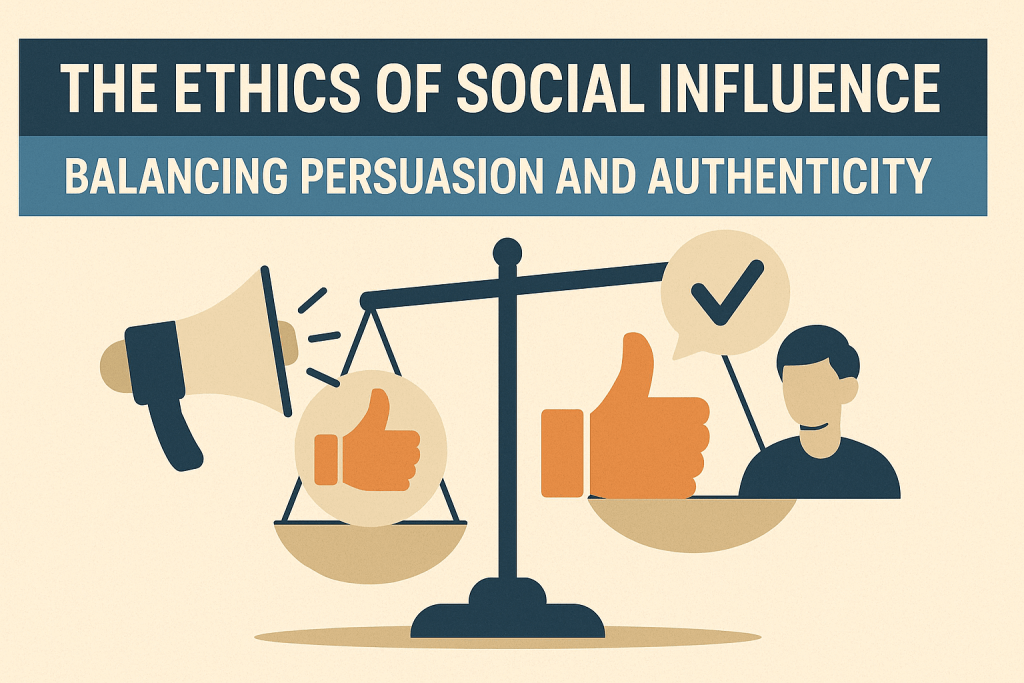In today’s interconnected world, social influence is a powerful force shaping opinions, behaviors, and decisions across personal and professional spheres. Whether it’s a marketing campaign, political movement, or everyday interpersonal interaction, the ability to persuade others ethically is crucial. However, with great influence comes great responsibility. The challenge lies in balancing effective persuasion with authenticity to maintain trust and integrity.
Much like how this website explores how to navigate casino and betting platforms responsibly while still maximizing engagement, ethical social influence requires thoughtful strategy, transparency, and respect for your audience. It’s not just about what you say — it’s about how, why, and for whom.
This article explores the ethical dimensions of social influence, why authenticity matters, and practical ways to ensure your persuasive efforts remain respectful and genuine.

Understanding Social Influence and Its Ethical Implications
Social influence refers to the ways individuals change their thoughts, feelings, or behaviors in response to the presence or actions of others. It can be subtle, like peer pressure, or explicit, such as a sales pitch. While influence itself is neither good nor bad, its ethical implications depend on intent, transparency, and respect for autonomy.
When persuasion crosses ethical boundaries, it risks manipulation — a form of influence that deceives, coerces, or exploits vulnerabilities for selfish gain. Manipulation erodes trust and damages relationships, both of which are critical for sustainable influence.
The Importance of Authenticity in Influence
Authenticity means being genuine, honest, and transparent in your communication, for social influencers — whether individuals, brands, or organizations — authenticity builds credibility and fosters deeper connections with audiences.
People are increasingly savvy and skeptical about overt marketing or spin. They value authenticity because it respects their intelligence and autonomy. When influencers are authentic, they:
- Communicate openly about their motives and intentions
- Share truthful and accurate information
- Acknowledge limitations or uncertainties
- Align their messaging with their values and actions
This approach not only improves ethical standards but also enhances the effectiveness of persuasion. Authentic messages resonate more and create long-term loyalty.
Ethical Principles to Guide Social Influence
Several key ethical principles can help balance persuasion with authenticity:
1. Respect for Autonomy
Respecting autonomy means honoring others’ right to make informed decisions without undue pressure or deception. Ethical influencers provide clear, accurate information and avoid exploiting emotions like fear or guilt.
2. Transparency
Being transparent about your goals, affiliations, and incentives builds trust. Disclose sponsored content, conflicts of interest, or any information that might influence perceptions.
3. Honesty
Truthfulness is fundamental. Avoid exaggeration, false claims, or selective information that could mislead your audience.
4. Fairness
Ensure your influence doesn’t unfairly disadvantage others or manipulate vulnerable groups. Promote inclusivity and equal respect.
5. Accountability
Take responsibility for the impact of your influence. Be open to feedback and willing to correct mistakes.
Practical Tips for Ethical Social Influence
Craft Messages with Integrity
When crafting persuasive messages, focus on factual evidence and genuine benefits. Avoid hyperbole or fear-mongering. Use storytelling to connect emotionally but remain truthful.
Know Your Audience
Understand your audience’s values, needs, and concerns. Tailor your messages to provide real value rather than just aiming for conversions or compliance.
Use Social Proof Ethically
Social proof — like testimonials and endorsements — is a powerful influencer tool. Ensure all endorsements are honest and that reviewers are real people sharing authentic experiences.
Promote Informed Consent
Give your audience the tools and information to make decisions freely. For example, if you collect data or ask for commitments, clearly explain how the information will be used.
Lead by Example
Walk the talk. Align your behavior with your messaging to demonstrate authenticity. This strengthens your influence and avoids accusations of hypocrisy.
Challenges and Gray Areas in Social Influence Ethics
Ethical influence is not always clear-cut. Consider the following challenges:
- Cultural Differences: What’s ethical in one culture might differ in another. Be sensitive and adaptable.
- Implicit Bias: Unconscious biases can affect how you influence others. Regular reflection and education help reduce this risk.
- Commercial Pressures: Influencers working with brands may face conflicts between profit motives and ethical standards. Clear guidelines and personal integrity are key.
- Manipulation vs. Persuasion: The line between influence and manipulation can be subtle. Continuous self-awareness and feedback help maintain ethical boundaries.
Why Ethics Matter in the Age of Digital Influence
Digital platforms amplify social influence exponentially. Messages spread quickly and reach global audiences, magnifying both positive impact and potential harm. Unethical influence can lead to misinformation, exploitation, and loss of public trust.
Conversely, ethical social influence strengthens communities, promotes informed choices, and supports positive social change. Whether you’re a marketer, content creator, leader, or everyday communicator, embracing ethics in your influence builds a foundation for lasting success.
Conclusion: Cultivating Trust Through Ethical Influence
Balancing persuasion and authenticity is essential to ethical social influence. By respecting autonomy, being transparent, honest, and accountable, influencers can inspire meaningful action without compromising integrity.
In a world where influence is everywhere, choosing ethics is not only the right thing to do — it’s a smart strategy. Authentic influence fosters trust, loyalty, and positive relationships that stand the test of time.
